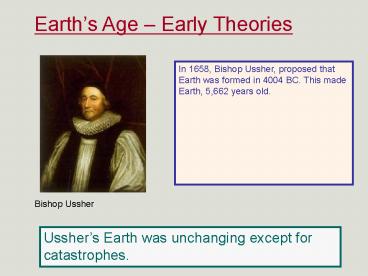Earths Age Early Theories - PowerPoint PPT Presentation
1 / 8
Title:
Earths Age Early Theories
Description:
In 1795, James Hutton proposed that moving rock layers form mountains and ... neck is then passed on to its offspring (inheriting acquired characteristics) ... – PowerPoint PPT presentation
Number of Views:23
Avg rating:3.0/5.0
Title: Earths Age Early Theories
1
Earths Age Early Theories
In 1658, Bishop Ussher, proposed that Earth was
formed in 4004 BC. This made Earth, 5,662 years
old.
Bishop Ussher
Usshers Earth was unchanging except for
catastrophes.
2
Earths Age Early Theories
In 1795, James Hutton proposed that moving rock
layers form mountains and valleys and this would
require Earth to be millions of years old.
James Hutton
Huttons Earth was changing shaped by
weathering and geological forces. Huttons views
were not widely accepted.
3
Earths Age Early Theories
In 1830, Charles Lyell said that Earth shaping
processes that happened in the past can be
observed today and Earth is millions of years old.
Charles Lyell
Lyells book, The Principles of Geology, was
widely accepted.
4
Earths Age Early Theories
During his trip, Darwin read Lyells book,
witnessed a volcanic eruption and an earthquake,
and found fossils of marine animals on a mountain
top.
Charles Darwin
Darwin agreed that Earth must be millions of
years old. He conclude that if Earth could change
over millions of years, maybe life could also.
5
An Earlier Evolutionary Theory
Lamarck proposed a theory of evolution before
Darwins theory based on the idea of use or
disuse
Jean-Baptiste Lamarck
Use or Disuse Theory
6
Lamarcks Theory
Lamarck proposed that traits could be acquired
during an organisms lifetime and these traits
would be passed on to offspring.
Reaching for tall branches stretches the
giraffes neck the longer neck is then passed
on to its offspring (inheriting acquired
characteristics).
7
Lamarcks Idea of Striving for Perfection
Lamarck also thought that all organisms were
striving to become more complex and perfect.
Jean-Baptiste Lamarck
Lamarcks Theory Is Wrong!
8
Idea of Limited Recourses
In an 1803 essay, Malthus said that there are a
limited amount of resources on Earth. Eventually
the competition for them would lead to war and
famine.
Thomas Malthus
Darwin read this essay before his trip - this led
to his idea that all organisms are in a struggle
for existence because of limited resources.































